It is quite possible that the coronavirus pandemic will represent the high-water mark for the appeal of the authoritarian model and of its two standard-bearers, China and Russia, according to Robin Niblett and Leslie Vinjamuri of Chatham House, the Royal Institute of International Affairs.
At the same time, democracies have shown the power and value of their diverse and independent civil societies, which have the freedom to mobilize to confront a crisis of this sort. Corporations, universities, foundations and nonprofit organizations are cooperating and innovating with local authorities and internationally, whether to deliver medical relief and social support or to secure a vaccine, they write for The L.A. Times:
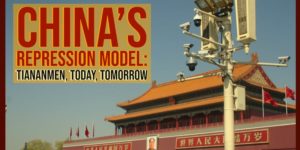
National Endowment for Democracy
In contrast, authoritarian states look brittle…..The fact is, authoritarian leaders can cope relatively well with geopolitical instability and opportunity, as Russia and Iran have demonstrated in the Middle East. Similarly, they can launch large-scale investment projects with geo-economic goals, as China has with its Belt and Road Initiative, with little concern about their long-term sustainability.
But in the face of an amorphous, cross-border virus that cannot be deterred, coerced or denied, authoritarian leadership reveals the shallowness of its power, as well as the bluff and bluster of its imitators, from Turkey to Brazil. By suppressing the power of civil society and independent media, these governments only hear bad news late and must then rely on rigid bureaucracies to deliver complex responses.
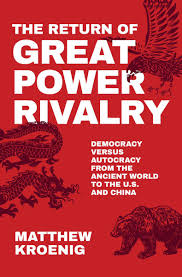 Democracy is a force multiplier that helps states punch above their weight in international geopolitics, according to a recently-published book (right).
Democracy is a force multiplier that helps states punch above their weight in international geopolitics, according to a recently-published book (right).
To better understand the conversation on U.S. policy toward China, it’s helpful to outline the central perspectives with greater nuance, argues Ganesh Sitaraman, a Professor of Law at Vanderbilt Law School and a Senior Fellow at the Center for American Progress. There are at least ten categories in the debate: four on the dovish side, and six on the hawkish side, he writes for Brookings’ Lawfare blog.
- Neoliberal doves hold that global economic interdependence should proceed at the greatest possible clip, and economic restrictions limiting trade between states should be as narrow as possible. … Economic power comes with geopolitical leverage, and the United States cannot ignore the power that China exercises.
-
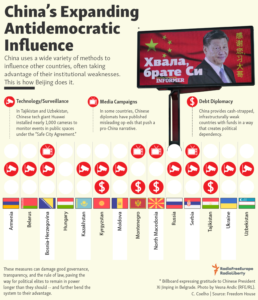
RFE/RL
Leverage doves, in contrast, recognize China’s rising power and the dangers it might bring. But they recommend that U.S. foreign policy pursue interdependence, rather than disentanglement between the two countries, in order to preserve American leverage over China. Leverage, they hope, will make conflict less likely. What the leverage argument too often ignores, however, is that China is moving swiftly to reduce its dependence on the United States, through a process of “indigenization”….
- Transnational doves believe the biggest threats to the United States—like climate change—can be solved only through U.S. cooperation with other great powers. Any dangers of a rising China are far less problematic than the extinction-level challenge posed by climate change, they argue, and hawkish policies will make collaboration less likely. ….
- Anti-war doves worry that hawkish language and policies of any type might increase the risk of war. Like Graham Allison, they are anxious about Thucydides’s Trap: that fear in each country might spiral out of control and push the U.S. and China toward a war neither country desires…
Turning to the hawkish side, there are six groups, he adds:
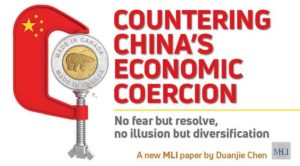 Liberal hawks are primarily worried about human rights…. But it is unclear whether they can have much of an impact: China’s use of technology for domestic social and political control, often called digital authoritarianism, coupled with its significant global power, makes this fight an uphill battle.
Liberal hawks are primarily worried about human rights…. But it is unclear whether they can have much of an impact: China’s use of technology for domestic social and political control, often called digital authoritarianism, coupled with its significant global power, makes this fight an uphill battle.- Nationalist hawks frame the China challenge through a racial lens, relying on xenophobic tropes to express their position. .. Comparatively few in foreign policy circles seem to hold this view, though those who do have a prominent voice in the current administration.
- Traditional hawks are worried about conventional political and military issues, but they attend little (or not at all) to economic power. They argue that the rise of neo-authoritarianism, including in China, is one of the central challenges facing the United States today..
- Leverage hawks, like their dovish counterparts, see the goal as having enough power and leverage to make China change practices like technology transfer and intellectual property theft. But unlike the doves, they don’t emphasize interconnectedness as their central strategy. Rather, they stress working with allies to develop a coalition that can put greater pressure on China to change its ways. …
- Corporatist hawks take China’s rising economic power seriously and see geo-economic competition as one of the central domains of the future. … The danger in corporatism is that the competition between China and the United States will become a contest between Chinese digital authoritarianism and American digital oligarchy—a government of tech magnates instead of we the people.
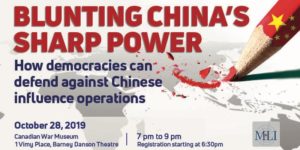 Resilience hawks also worry about China’s rising economic power and the dangers it poses—but they are equally worried about the inequality of wealth and power in America. … Their aim is not to change China but, rather, to develop resilience to defend democracy in America and like-minded countries. …… The central problem for resilience hawks is that many of the policies necessary to ensure a resilient democracy, social infrastructure and economy run directly counter to the interests and political preferences of those who have power and influence in American politics (on both sides of the aisle), making implementation difficult.
Resilience hawks also worry about China’s rising economic power and the dangers it poses—but they are equally worried about the inequality of wealth and power in America. … Their aim is not to change China but, rather, to develop resilience to defend democracy in America and like-minded countries. …… The central problem for resilience hawks is that many of the policies necessary to ensure a resilient democracy, social infrastructure and economy run directly counter to the interests and political preferences of those who have power and influence in American politics (on both sides of the aisle), making implementation difficult.
But liberal, traditional and resilience hawks could find common cause in restricting corporations from export, investment, etc, that result in accelerating digital authoritarianism, Sitaraman concludes. for Brookings’ Lawfare blog.
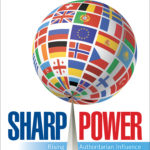
National Endowment for Democracy (NED)
The COVID-19 crisis has triggered a new debate within Europe about the need for greater supply-chain “diversification,” and thus for a managed disengagement from China. That will not be easy, and it won’t happen quickly. But, clearly, Europe has abandoned its previous ambition for a more closely integrated bilateral economic relationship with China, argues Mark Leonard, Director of the European Council on Foreign Relations.
Three factors have altered Europe’s strategic calculus, he writes for Project Syndicate:
- The first is a long-term change within China. The EU’s previous China policy was based on the so-called convergence wager, which held that China would gradually become a more responsible global citizen if it was welcomed into international global markets and institutions. Instead, the opposite has happened. Under President Xi Jinping, China has become more authoritarian….
- Second, the United States has increasingly adopted a more hawkish view of China…Consider the way many European states are struggling to placate both the US and China over the Chinese tech giant Huawei’s role in building European 5G networks.
- But the third (and most surprising) development has been China’s behavior during the pandemic…… Consider one telling episode from the pandemic. Early this year, as the coronavirus was raging through Wuhan, EU member states shipped nearly 60 tons of medical equipment to China. Much of this came from national strategic stockpiles, and it was sent discreetly, at China’s behest. By contrast, when the pandemic arrived in Europe, the Chinese government made a big show of offering “aid” to Europe – much of which actually came with a price tag….RTWT
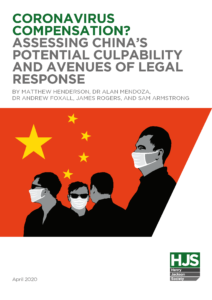 There is authoritative and compelling evidence – including a study from the University of Southampton – that if interventions in China had been conducted three weeks earlier, transmission of COVID-19 could have been reduced by 95 per cent, according to two leading experts.
There is authoritative and compelling evidence – including a study from the University of Southampton – that if interventions in China had been conducted three weeks earlier, transmission of COVID-19 could have been reduced by 95 per cent, according to two leading experts.
Meanwhile, an analysis of Chinese censorship around COVID-19, by the Munk School’s Citizen Lab, found that “Censorship of COVID-19 content started at early stages of the outbreak and continued to expand blocking a wide range of speech, from criticism of the government to officially sanctioned facts and information.” note David Matas and Irwin Cotler.
The Chinese government’s wrongdoing and the suffering of its victims within its borders and internationally calls out for justice and accountability. There are clear and compelling legal remedies that should be considered to effectively address and redress this matter, they write for IRPP’s Policy Options, including:
- The United Nations Charter provides that the UN General Assembly may request the International Court of Justice (ICJ) to give an advisory opinion on any legal question. Any UN member state can ask the General Assembly to make such a request to the ICJ, and China would not be able to veto such a resolution. The General Assembly could therefore request that the ICJ determine whether the actions of Xi Xinping’s China regarding coronavirus were in breach of its international legal obligations.
- The United Nations Human Rights Council can pass a condemnatory resolution, or even establish a commission of inquiry into China’s actions regarding the coronavirus. If such initiatives are unlikely to muster the necessary majority of votes by member states of the council, independent statements can be made at the council’s regular sessions. ….
- The UN Special Rapporteur on the Right to Health, currently Dr. Dainius Puras, can consider individual complaints, issue annual reports and conduct country visits. …
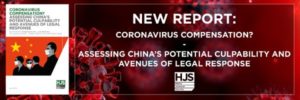 It is hard to imagine an alternative to the current international order based on sovereign states, argues Nancy Birdsall, President Emeritus and a senior fellow at the Center for Global Development. Historians generally view the creation of the current state system as a key contributor to a less violent world in which more people lead better lives than ever before. Indeed, the economist Dani Rodrik has argued that the nation-state is a prerequisite for liberal democracy, and democracy could not possibly work at the global level, she writes for Project Syndicate:
It is hard to imagine an alternative to the current international order based on sovereign states, argues Nancy Birdsall, President Emeritus and a senior fellow at the Center for Global Development. Historians generally view the creation of the current state system as a key contributor to a less violent world in which more people lead better lives than ever before. Indeed, the economist Dani Rodrik has argued that the nation-state is a prerequisite for liberal democracy, and democracy could not possibly work at the global level, she writes for Project Syndicate:
At the same time, however, the pandemic has reminded us that we are heavily dependent on cooperation among states. Such cooperation can be explicit, as with trade agreements, or implicit, such as in managing global financial risk or meeting the goals of the Paris climate agreement. Today, a failure to collaborate in tackling COVID-19 will threaten all of us, because everyone is vulnerable to the virus until no one is.
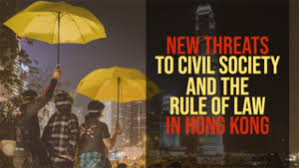
National Endowment for Democracy
Beijing has announced a national security law for Hong Kong at its annual week-long political meeting which began on May 22, 2020, the SCMP adds (above). While nothing is set in stone yet, the law is expected to ban secession, violence and terrorist acts which take place in Hong Kong and are aimed at toppling the central government. The resolution will be voted on by members of the National People’s Congress (NPC) on Thursday, May 28. It is widely expected to be passed by the country’s highly choreographed parliament.







